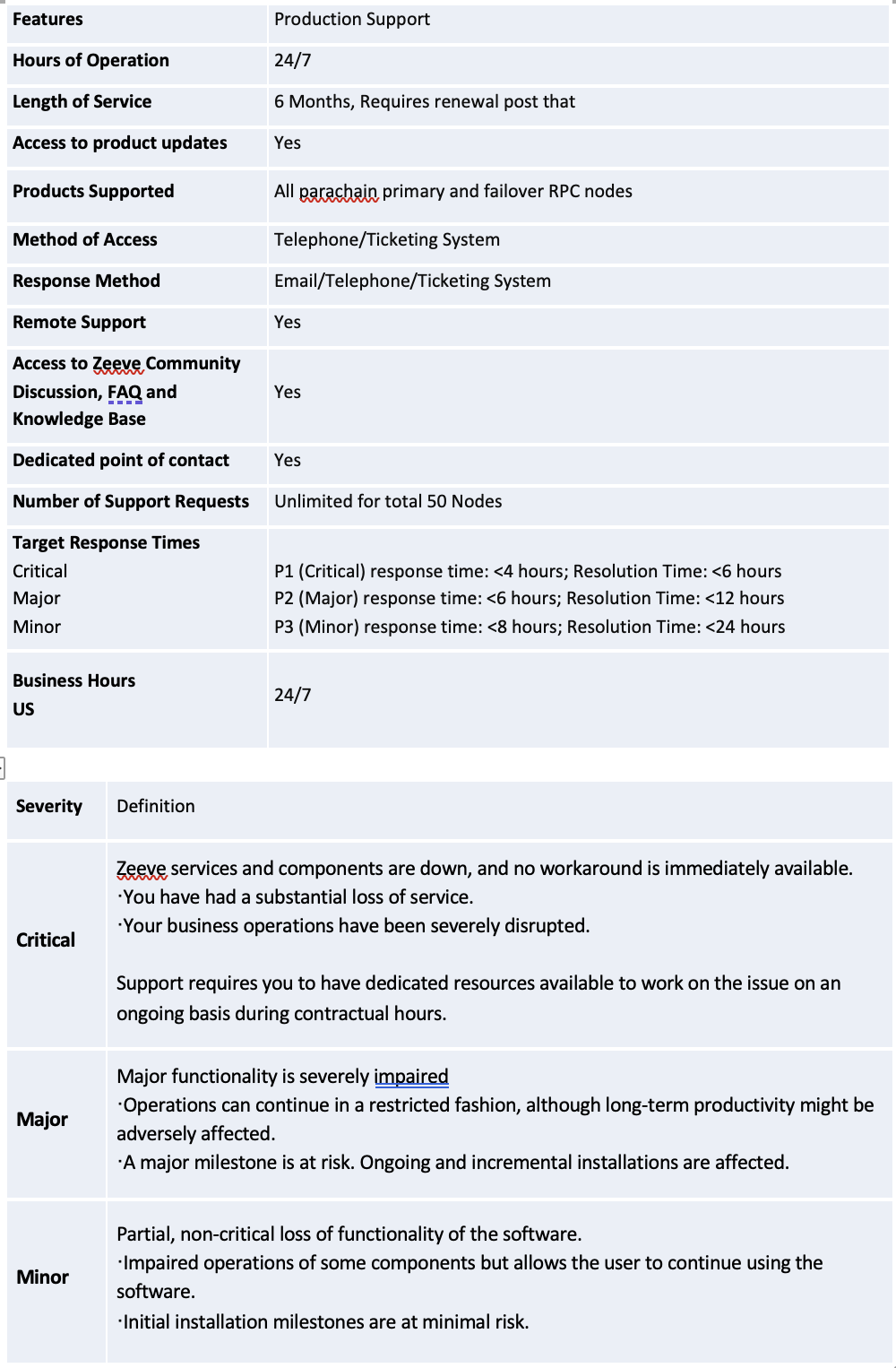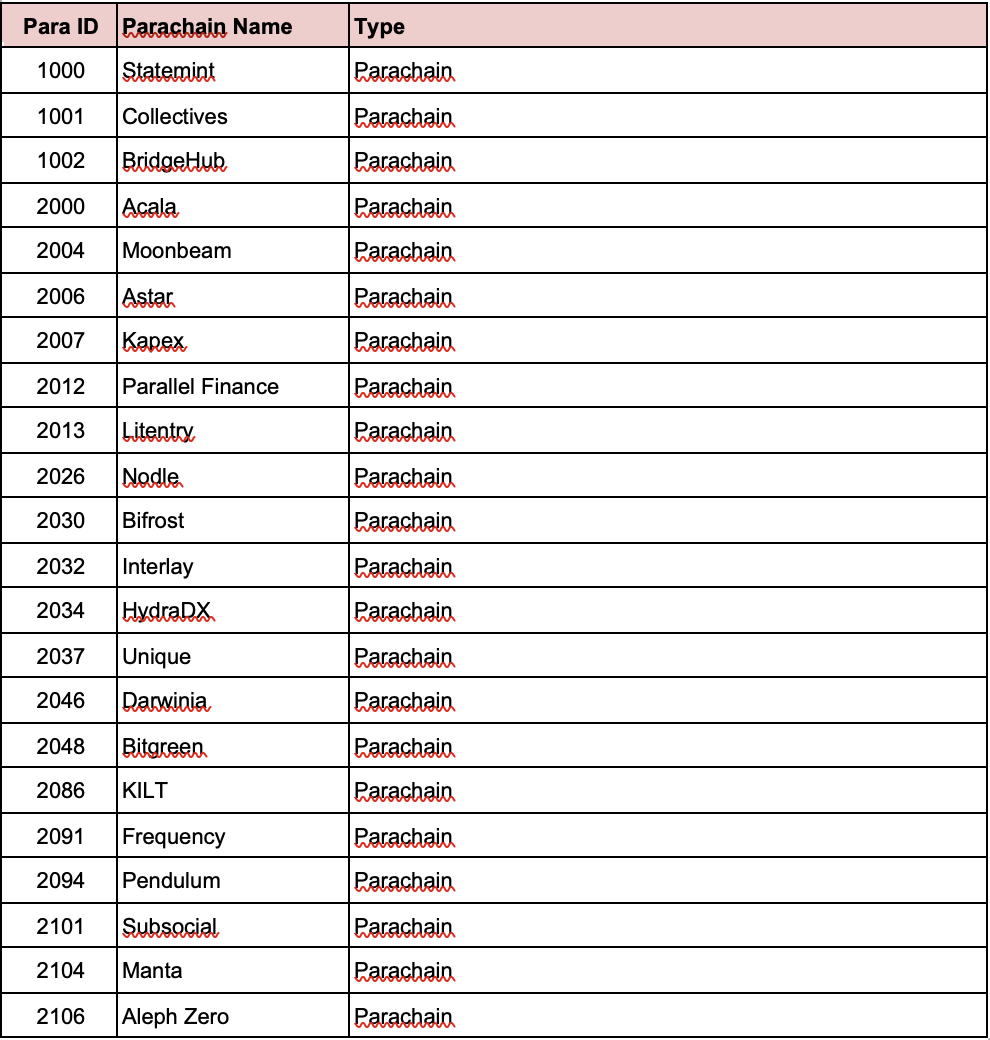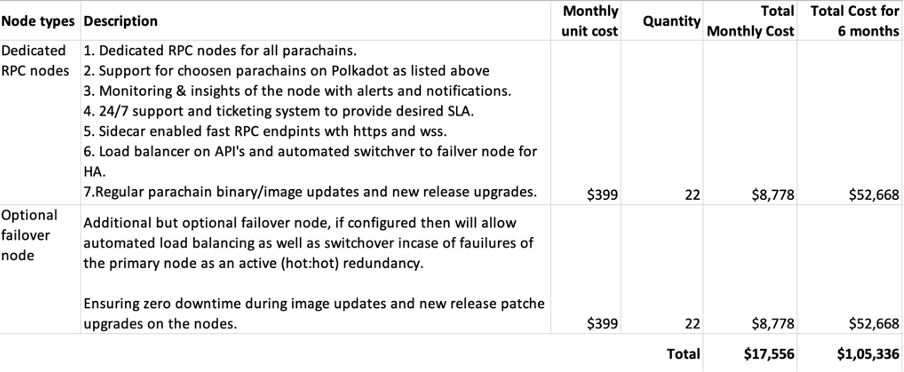- Treasury/
- Proposals/
- #297/
Zeeve | Infrastructure Costs of Zeeve RPC APIs for 22 Polkadot Parachains - A Treasury Proposal
Rejected
Content
AI Summary
Zeeve | Infrastructure Costs of Zeeve RPC APIs for 22 Polkadot Parachains (from July to December 2023)
Blockchain has reached beyond just being a new technology and is being utilized to solve real-world problems. A lot of use cases are being developed, and the ecosystem is growing really fast, and so are the node infrastructure and requirements for application builders. The Polkadot ecosystem has grown massively and is a key driver to many such live implementations. However, building and running decentralized applications across several parachain networks requires secure RPC endpoints.
One of the most prominent reasons of all is the affordability and the cost of running the RPC APIs to build upon, and it is becoming an entry barrier for adoption. Even if the cost is made free for the end users, developers, and businesses, there still is this high cost of operation for the community ecosystem itself. The challenge as we see, is directly affecting the Polkadot ecosystem adoption overall, to be the preferred ecosystem for future web3 industry applications.
Most of the RPC providers are charging huge costs to the treasury and still fall short of the expected returns. The developers require secure APIs with higher throughput and limits. They also require proactive monitoring, alerts & notifications, enterprise SLA and robust documentation so that the developers can focus on building the dApps.
We aim to provide the RPC endpoints for some of the most active parachains on the Polkadot ecosystem free to the end users while proposing a low cost for maintenance. Our goal is to provide the enterprise-grade, fully managed endpoints with 24/7 monitoring and support so to allow developers to build, test and deploy the same to production without switching providers.
We at Zeeve will manage the nodes and the infrastructure for these Parachains to ensure high performance (up to more than 4,000 to 5,000 API requests per second). We also will provide high availability and automated failover to users on RPC endpoints for sensitive and scalable projects.
Zeeve will continue to run a set of RPC nodes for Polkadot and all of their parachain networks and offer them to the ecosystem teams to help build community tools, APIs served, endpoint-wise reports, analytics, and reporting on all the parachain network RPC endpoint to be made publicly available for all the developers across the globe.
The full proposal is given below.
Proposal: High-Performance RPC APIs for Polkadot parachains
Date: 07/06/2023
Requested DOT: 21025 DOT ~ USD 105,336 (for 6 Months - July 2023 to December 20234)
DOT Account: 1zhukWzj6pTskKUhDmyCaoJLuaHp5AVMDn5uLoNXTrw2gDR
Short Description: Provide free managed, secure, and production-grade RPC endpoints for Polkadot Parachain’s to web3 startups, businesses, and developers alike, building test and production decentralized applications.
Note: This proposal is only for Polkadot’s parachains ongoing running cost for July 2023 to December 2023 - this will be proposed again in January 2024.
Background
About Zeeve
Zeeve is a Blockchain Infrastructure automation platform. It's a SaaS offering for the Polkadot/Substrate ecosystem, along with other leading public and enterprise Blockchain protocols. We have been providing a very reliable, enterprise-grade, and secure one-click deployment for Polkadot and other Substrate protocols, including high-performance Dedicated nodes, full nodes, and validator nodes. On the other hand, we also provide plug-and-play elastic API for both Polkadot and Kusama networks and respective parachains. We recently launched a completely managed substrate parachain stack to help all the existing and upcoming Parachains, which reflects on our commitments to ensure that Blockchain is made available to all with or without in-depth infrastructure know-how, to help the developers get access to high performance and quality infrastructure under the hood and build decentralized applications without working about the API, Index data and Node layer operations and complexities. We further enhanced our node quality and security by acquiring the SOC 2 Type2, ISO, and GDPR certifications.
On the other hand, we have been actively working to make the Polkadot and Kusama ecosystems better. We have been trusted with a grant to automate Zombinet testing through a no-code UI and SDK approach (https://github.com/Zeeve-App/larch). also, a new grant is allocated and in progress (bound to terms of the grant, can't divulge more).
Team
Zeeve is a team of 120+ Blockchain and DevOps experts led by a seasoned team of technology innovators sharing among them 40+ years of experience and are committed to ensuring the best of the infrastructure capabilities for the web3 ecosystem.
Dr. Ravi Chamria - Co-founder & CEO (https://www.linkedin.com/in/rchamria/)
Entrepreneur with 20+ years in IT consulting spanning across Fintech, InsureTech, Supply Chain, and eCommerce.
Ghan Vashishtha - Co-founder & CTO (https://www.linkedin.com/in/ghan-vashishtha/)
15+ years in Telecom, Defense & aerospace, Media & broadcasting, a proven product innovator, active web3 contributor and enthusiast.
Sankalp Sharma - Co-founder & VP of engineering (https://www.linkedin.com/in/sankalp-sharma-502008139/)
6+ Years of experience in Blockchain solution design and architecture. An active web3 contributor and builder in both public and permissioned blockchains.
Problem Statement
Blockchain has reached beyond just being a new technology and is being utilized to solve real-world problems. A lot of use cases are being developed, and the ecosystem is growing really fast, and so are the node infrastructure and requirements for application builders. The Polkadot ecosystem has grown massively and is a key driver to many such live implementations. However, building and running decentralized applications across several parachain networks requires secure RPC endpoints.
One of the most prominent reasons of all is the affordability and the cost of running the RPC APIs to build upon, and it is becoming an entry barrier for adoption. Even if the cost is made free for the end users, developers, and businesses, there still is this high cost of operation for the community ecosystem itself. The challenge as we see, is directly affecting the Polkadot ecosystem adoption overall, to be the preferred ecosystem for future web3 industry applications.
Most of the RPC providers are charging huge costs to the treasury and still fall short of the expected returns. The developers require secure APIs with higher throughput and limits. They also require proactive monitoring, alerts & notifications, enterprise SLA and robust documentation so that the developers can focus on building the dApps.
Why Polkadot Parachains
Polkadot is a distinct and future-ready architecture network, driving an ecosystem of serious and promising projects, with thousands of developers contributing to these. Polkadot network and its parachains have a cut above community on decentralized application development, interoperability, and scalability. The presence of a Blockchain Infrastructure automation platform (BIaaS) is a dire need of the community to help the ecosystem to scale and thrive. Polkadot is onboarding newer parachains and building a future of a decentralized economy, a lot of new features are still under development, and more contributions are being done to smart contract capabilities and interoperability.
Proposed Solution
Scope
We aim to provide the RPC endpoints for some of the most active parachains on the Polkadot ecosystem free to the end users while proposing a low cost for maintenance. Our goal is to provide the enterprise-grade, fully managed endpoints with 24/7 monitoring and support so to allow developers to build, test and deploy the same to production without switching providers. The endpoints will have the following capabilities offered through the Zeeve-managed no-code platform:
DIY shared endpoint creation using the Zeevee platform with free signup
https and wss endpoints
sidecar enabled by default or as an option
Secure with API key or simple auth
Alerts, notifications, and alarms on issues
Metrics to measure total API hits and failed responses per RPC endpoint
99.99% SLA with 24/7 support
Managed updates and upgrades to new releases and patches
Automated load balancer with failover switchover
We at Zeeve will manage the nodes and the infrastructure for these Parachains to ensure high performance (up to more than 4,000 to 5,000 API requests per second). We also will provide high availability and automated failover to users on RPC endpoints for sensitive and scalable projects.
Zeeve will continue to run a set of RPC nodes for Polkadot and all of their parachain networks and offer them to the ecosystem teams to help build community tools, APIs served, endpoint-wise reports, analytics, and reporting on all the parachain network RPC endpoint to be made publicly available for all the developers across the globe:
This funding grant is for the ongoing running costs of this pool of nodes for all the parachains of Polkadot networks, currently estimated for 22 nodes at USD $17,556 a month with a failover node per parachain (another 22 nodes included in cost).
The addition and decommissioning of any parachain archive node can be done based upon some community voting or governing criteria by ecosystem teams.
The RPC endpoints will be pre-built for Sidecar API support and will be able to provide so out of the box without any additional setup.
We’ll maintain all the nodes 24/7 with high quality and response for the APIs as well as provide support to ensure the enterprise SLA and uptime management.
We will also update these nodes with the latest releases and security patches every time a parachain releases the update.
Infrastructure flexibility
These nodes will be configured to perform and accommodate 4,000 - 5,000 RPC requests per second. However, to keep the uptime and decentralization in mind, these will be spread across multiple cloud providers over different geographies to achieve the best global latencies (applicable in failover configurations). The distribution of nodes will be in multiple data regions across Europe, the US, and APAC regions. However, in case of additional failover node setup, each of the nodes will reside in different geography so to ensure DR on the service.
The choice of data center regions is open and will be decided based on community and ecosystem team inputs.
Enterprise SLA (99.999% uptime)
High-performance failover
The node setup will be equipped with an automated switchover with an additional node configured, which will function in an active: active formation ensuring the endpoints are highly available and even the upgrades and patches on the clients/nodes are done without any downtime. The configuration will also be an automated load balancing while considering a fast switchover in case one of the endpoints stops responding or isn’t available.
Yearly Recurring Grant
Initially, a total of 44 nodes for the 22 most active parachain will be commissioned. These will be dedicated nodes and serve more than ~400 million monthly requests for each parachain. We will provide this data to the community as well based on actual month-over-month consumption. We will set up tools and monitor these nodes 24/7 with enterprise SLA to enable global scale and increase service resiliency. The initial 6-month cost to maintain the infrastructure will be $105,336. The infrastructure pool will be scalable on demand.
We continue to work with the Polkadot ecosystem to identify more parachains for which the enterprise-grade node infrastructure would be required. The turnaround time for any additional parachain will be about 1-3 days. It is subjective to the sync time basis, the total size of the parachain, and the availability of the snapshot.
Parachains to be supported in the proposed scope are:
Fund Management
Fund Allocation Plan:
DOT tokens will be taken based on the 30-day average price on the 1st of July 2023: USD $5.13 (today) / DOT. The payment is expected to be quarterly in advance, and we will submit the reports and payment requests for each quarter.
Fund Manager: Ravi Chamria ([email protected])
1zhukWzj6pTskKUhDmyCaoJLuaHp5AVMDn5uLoNXTrw2gDR
Communication channels: We plan to provide monthly updates with the Polkadot ecosystem and in various Element communication channels of the usage of the aforementioned Dedicated RPC nodes service. All the updates and reports related to the health, uptime, consumption, and performances of these nodes will be submitted on the original on-chain Treasury proposal post on Polkassembly.
Costs Breakdown:

The total cost of running for 6 months:
21025 DOT ~ USD 105,336
The proposal has also been submitted as a treasury proposal.
- Zeeve provides infrastructure for Polkadot's parachains to help developers build applications.
- The project aims to offer free, secure, and high-performing RPC endpoints for developers.
- There are challenges, such as high costs for running these APIs, which can make it hard for new developers to join.
- Zeeve plans to monitor and support these APIs 24 hours a day to keep everything running smoothly.
- They will also ensure that the infrastructure can handle many requests quickly.
- The funding needed for this project is about 21025 DOT (around $105,336) for six months.
- Zeeve is committed to helping the Polkadot community grow by providing tools and resources for developers.
Metadata
Timeline
Timeline
Comments